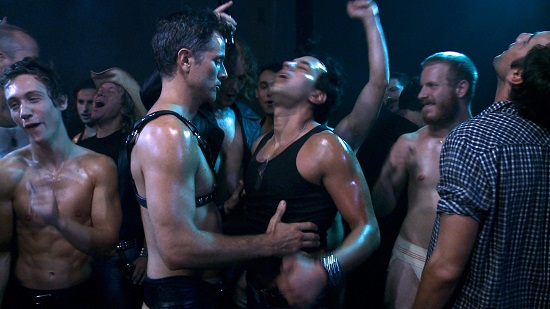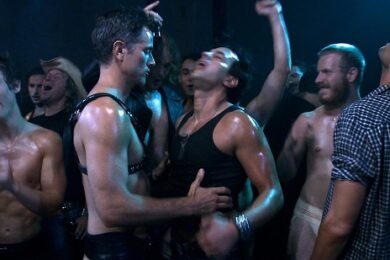Joseph Burnett writes
The Empire Never Ended
Sci-fi fans might recognise the above statement from the great Philip K. Dick’s novel Valis. For Dick, the sentence signifies -I think– that the Roman Empire was the construct of an insane god whose nebulous influence traversed time and space and was reincarnated in the imperialist tendencies of Nixon’s United States. I make no such bold exegesis, but, nonetheless, the phrase kept running through my head throughout the 27th edition of the London Lesbian and Gay Film Festival. Whilst I do not have any grandiose vision of the nature of time and reality, it is clear that, whilst the rights of gay and lesbian people in the UK have come along in leaps and bounds, many films in the programme highlighted just how far we have to go on a wider scale, and that the spectre of hate-filled prejudice, brewed over centuries, still looms heavily over the global LGBT community.
Take Taboo Yardies (dir. Selena Blake), for example, a harrowing documentary about life for LGBT people in Jamaica. Blake’s interviews with people in Jamaica are downright scary. The level of violent hatred -extending even to people saying they’d kill their own children if they found out they were gay – is beyond anything I’m used to witnessing, and the testimonies from gays and lesbians living on the island (with obligatory pixelated faces) are heartbreaking. Whilst there are very positive interviews in the film with Jamaicans both gay and straight now living in the US, and with a couple of psychologists based in Jamaica, all debunking (and perspicaciously analyzing) Jamaican attitudes to LGBT people, the most important man interviewed, the island’s prime minister (until 2011, but interviewed before he left office), trots out the same kind of putrid bigotry one hears time and time again from right-wing twits in America and the UK. At the end of the film I was left with an exhausting sense of hopelessness. We’ve come so far here, but for Jamaican (or Ugandan, or Nigerian, or Kenyan) LGBT people, the reality is close to nightmarish. What is also noted is that Jamaica’s anti-sodomy laws are a hangover from British rule of the island. The Empire never ended indeed. Taboo Yardies is a brave documentary, but does little to suggest things will change for the courageous, isolated, gay, lesbian and transgender people living in terror in Jamaica.
More uplifting was Facing Mirrors (dir. Negar Azarbayjani), a hugely effective emotional drama in which an ordinary Iranian woman is confronted with her own prejudices when she helps out (inadvertently, then against her will, and finally with conviction) a transgender woman who wants to escape to Germany in order to transition to being a man. Facing Mirrors forgoes overt political statements to concentrate on the emotions and experiences of its protagonists, and is filmed in a realistic style, mostly with hand-held cameras. The two main actors are excellent, especially Ghazal Shakeri as Rana, who expertly balances melodrama and understatement as her character goes from naive conservatism to acceptance.
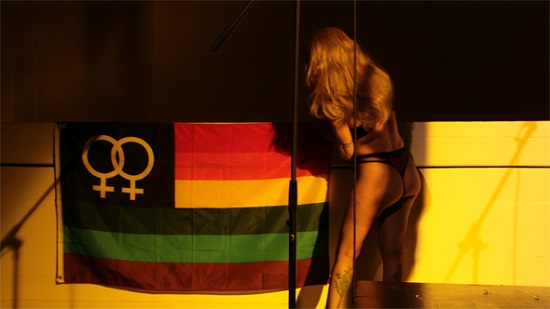
Also touching on the much-covered theme of homophobia was short film Queer Beograd Border Fuckers Cabaret (dir. Jet Moon), a documentary about how radical, feminist queer performers in Serbia are fighting back against the intrinsic bigotry they encounter from all sides, including supposed allies on the left. It’s an eye-opening piece, sadly undermined quite a bit by weak production values and a tendency to rely on shoddily-filmed performance footage. A shame, but also a reminder that homophobia is not just restricted to Africa or the Caribbean, and in fact still festers in European society (see the 300,000 who demonstrated -violently- in Paris against gay marriage).
Films like Taboo Yardies and Facing Mirrors highlight how unfortunate people in places like Jamaica and Iran are if they’re LGBT. These are often countries in the UN or the Commonwealth, and yet their institutionalised hatred remains only mildly condemned by those who are supposed to uphold and enshrine human rights. Equally, all the above-mentioned films reminded me that more Tory MPs in the UK voted against gay marriage than for it, despite David Cameron’s attempts at modernisation. It would be too easy to think we can rest on our laurels: this is an issue for LGBT people everywhere. The gruesome spectre of old world hatred and bigotry haunts us all. ‘The Empire never ended.’ How’s about we make sure it does, soon?
We are not alone
By that, I do not mean that we lesbian, gay and bisexual people are increasingly surrounded by allies amongst straight people, although that was also made quite clear to me across the festival’s ten days, but rather that we have often overlooked the other members of queer society. How often do we, the majority of our minority, display true solidarity towards transgender and intersex people? The ‘Bodies’ section of the programme seemed to dwell at length on this issue, through a number of documentaries (and the occasional fiction) exploring themes of gender identity. Of course, we had the uproarious and frankly excellent I Am Divine (dir. Jeffrey Schwarz), an hilarious homage to Harris Glenn Milstead, aka Divine, cross-dressing superstar of John Waters’ best films and successful disco diva. It’s a bittersweet portrait of a unique individual who pushed back the boundaries of taste and acceptance and ultimately paved the way for a lot of drag performance as we know it. I for one will be eternally grateful to Divine.
But perhaps the strongest social and, dare I say it, political stance that Divine took was to present himself the way he did despite being overweight. This isn’t explored in the film as much as I would have liked. How often do we hear talk of ‘body terrorism’ in the gay (male) community? A lot. By refusing to be cowed into covering himself up when in drag, Divine set a marker down to us all.
I – unlike some in the film – do not feel it is appropriate to label Divine as ‘she’ or ‘her’, because Milstead was at pains throughout his career to stress that he did not want to be a woman, even though he dressed up as one. So, as enjoyable as it is, I Am Divine offers little insight into issues of gender (and yes, I know that was never the aim). Much more enlightening, in that sense, is Intersexion, a documentary by Grant Lahood, focusing on the opinions and experience of intersex activist Mani Bruce Mitchell and his/her friends.
I can honestly say that it’s been a long time since I’ve seen such an eye-opening documentary, and much of my assumed knowledge was proved to be false. I am ashamed to admit how little I knew about intersexuality before seeing the film, and my eyes were opened to the pain and discrimination intersex people are subjected to, from the moment they are born and parents and doctors decide to use surgery to impose a gender on people who, in terms of sexual organs, do not have a defined one. I recommend that all see the film, but suffice to say, the results of surgery are traumatic and agonising. And that’s before we get onto the stigma and prejudice most, if not all, intersex people go through. As one of the film’s interviewees, Esther Morris states, it’s like society is “trying to build a heterosexual”. It’s clear that, whilst the bandwagon of gay, lesbian, bisexual and, to an extent, transgender rights has gathered steam, intersex people are forced to live in the shadows or subsist on lies, because even LGBT people tend to reject someone who doesn’t have a clearly-defined gender.
Before the festival, a friend asked whether films about intersexuality should really be featured in the programme, as they didn’t “count” as gay, lesbian or trans. After seeing Intersexion, I can emphatically say yes. And for two reasons. Firstly, the vast majority of men and women interviewed in Lahood’s film lived as gay men or women, despite having some element of the genitals of the “opposite” sex from the one they chose to embrace. Secondly, and I think this is more important: gay, bisexual and transgender men and women spent too long as outcasts to do the same thing to others. Intersex people are still treated horribly, and if the LGBT community can help by lending its voice and support, then it should. Intersexion may be simply made, but it’s an eye-opening, affirmative piece of cinema.
Conservatism is killing the alternative
It’s like with British rock: the more the ‘indie’ bands (who aren’t really indie because they sound like Oasis or The Libertines and end up signing for EMI) get absorbed by the industry, the less radical and more banal it all sounds. The edge has been taken out of British rock, after 40-odd years of record-industry interference, and I’m not sure we can get the spirit of, say, Hawkwind or Gang of Four, back.
It would appear the same goes for us queers (and I apologise now to gay women, as this segment focuses mainly on the gay male experience which I, for obvious reasons, know better). I have already lamented the rise of conservatism among gay men on this site, but what I had not thought of is how the rise of the Lady Gaga-devoted, Thatcher- and Queen Elizabeth-loving, fashion-and reality TV-obsessed gay male would effectively do away with the gay sexual underground. And it’s happening. In the highly-anticipated Interior. Leather Bar., director/actor/all-round super-celeb James Franco notes that one of his professors had highlighted that the push for gay marriage has led to a normalisation that leaves gay people who are drawn to BDSM or cruising at an increasing risk of being marginalised, even denounced, by their own community. Interior. Leather Bar. sadly doesn’t build on this idea in a very successful way. Its premise is that directors and actors Travis Matthews and Franco wanted to recreate the mythical lost 40 minutes of hardcore footage from William Friedkin’s Cruising. Although the film is more entertaining than I was expecting, its focus on straight actor Val Lauren’s (faked) discomfort and watered down ‘hardcore’ footage ultimately means that its message seems confused and undefined. Unlike, say, the short Little Gay Boy Chris T is Dead, in which a young man explores the underworld of BDSM in Paris, intercut with footage of S&M and an arresting, Aktionist segment of alternative dance. It’s an uncomfortable 30 minutes, but it highlights quite neatly the conflict between desire and fear that lies at the heart of BDSM.

Before Interior. Leather Bar’s screening, two intriguing shorts were shown, one a brief history of the career of artist and pornographer Avery Willard (mentioned recently in Keep The Lights On), the other, Todd’s Gifts, an extract from a portmanteau project by Todd Verow focused on cruising. In the Q&A following Todd’s Gifts, both Verow and the short’s director Charles Lum lamented that cruising is in decline as gay people edge closer and closer to the mainstream. It’s an interesting point (echoed somewhat facetiously by John Waters in I Am Divine when he mentions that the period before homosexuality was made legal in the US was “kind of more fun”), and one that showcases a certain schism in the psyche of gay men, between the young and the, shall we say, more mature. In its brief seven minutes, Todd’s Gifts, and the premise of Verow’s final film The End of Cruising, throw up important questions: does mainstream acceptance by straight society engender conformity? Are (young) gay people turning on those that once relied for pleasure on saunas and illicit sex on Hampstead Heath? Are we losing the frisson that made so many gay artists and activists push the boundaries of creative and political impetus? Of course, tying illicit sex and LGBT activism together is a long stretch, but all the above films made me wonder why the decline of one seems to have gone hand-in-hand with the similar mellowing of the other.
If the 27th London Lesbian and Gay Film Festival taught me anything, it was that we are not done. In light of Taboo Yardies, let us not forget that, as both Labour and Conservative governments of recent years have played the populist card and tried to “crack down on immigration”, a number of LGBT people seeking refuge in the UK have found themselves at risk of being sent back to their home countries to face persecution, violence and even death. The debate over the festival’s name passed me by, but Intersexion reminded me that the queer (for want of a better word) community is vast, and not restricted to homosexual women and men. And, try as some might -in the wake of increasing improvement of rights here in the UK- to focus on pop songs, mortgages, reality TV, the chap on benefits next door or whatever, complacency and egotism will only harm the entire LGBT community as a whole, be it in Jamaica, Tehran or London. Solidarity got us where we are – that and an eye and ear for transgression. We still need that spirit. I was disappointed that more young gay men didn’t attend the festival (it’s curious to notice that young gay women were far more present, both among the public and the press), and can only put it down to indifference or complacency. We’ve got this far, but The Empire still stands.
Joe Burnett
Val Phoenix writes:
With last year’s box office surpassed and filmmakers and festiegoers headed home, it’s time to assess this year’s event. Think of it as a growth opportunity.
Love = hairy ectoplasm
It’s often said that teenaged girls experience emotions in such heightened form as to effect complete transformations in their personalities. Well, taking that notion to heart is Bradley Rust Gray, whose Jack and Diane features two would-be lovers whose romance is interrupted by interludes of menacing hairy ectoplasm standing in for budding love. While clever one-liners keep the atmosphere light, the horror element (which is only a clumsily executed metaphor) jars badly. Oh, and Kylie Minogue plays a tattooed cougar type who locks lips with the Jack character. She may yet have a future as a Dykon.
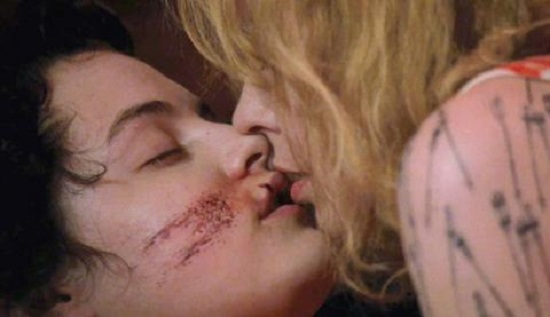
Not nearly so dramatic, but a bit more dramatically satisfying is Mosquita y Mari, Aurora Guerrero’s delightful SoCal Latina growing pains drama, in which two girls from opposite sides of the street try to find a middle road for their relationship. While foregrounding the girls’ relationship, Guerrero is also adept at outlining the family pressures that surround them. A real find. And with no ectoplasm on show.
Real men never tuck
Diane Torr’s Man for a Day workshops allow women, beauty queens and housewives alike, to tap into their inner man, complete with sideys, cotton wool phalluses and appropriate headgear (men never tuck their hair under their hats, as Torr advises one participant). If it seems a bit gender-essentialist, well, Torr reasons that teaching women typically ‘masculine’ behaviour can help them subvert it. Katarina Peters’ Man for a Day presents Torr’s week-long workshop, staged in Berlin with participants cast by the director (a fact that emerged in the Q&A), which rather changes how one views it. Exposing unsuspecting men on the street to the female gaze, the participants choose "their” man and build a character from his behavioural traits.
What is quite interesting is how some of the participants react to their week-long ‘training’ to be men. Two women continue their dressing-up to visit strip clubs, while another, who works in politics, comments that she is able to assert herself better after the experience.
The most poignant utopia is a lost utopia
Lesbiana: a parallel revolution is Myriam Fougere’s recollection of lesbian separatist culture in the 1970s and 80s, when womyn roamed the land, and a festival circuit criss-crossed North America. Featuring recent interviews with women Fougere first met 25 years ago on her travels as an artist along the Eastern Seaboard, the film charts the movement’s decline in the ’90s. Women’s land still exists, but with an ageing population and patriarchy still to be destroyed, it’s become home to retirement communities in places like Florida and Arizona (aka God’s Waiting Room).
There’s more to Toronto than Neil Young
Kevin Hegge’s doc She Said Boom: the Story of Fifth Column memorialises the titular group, Toronto’s foremost queer punk feminist band, who emerged alongside the advent of homocore (a movement named by band member GB Jones). Speaking at the festival, Hegge declared that, for all the amazing women the city has produced, Toronto is still mainly known for The Neil. Setting his interviews in odd locations (GB Jones seems to have popped out of a film noir), Hegge gives their contradictory accounts of who, what, where, as well as delightful clips of the band’s videos and Jones’ Super 8 films (one of them featuring Bruce LaBruce as a go-go boy) that give a feel for the late ‘80s as a golden age of art punk, at least in Toronto. These days, Hegge revealed, the former members of the band don’t speak. But their attempts to ally feminist politics with cinematic and artistic points of view, while positioning themselves in the punk milieu, remain groundbreaking.
Anger is an energy
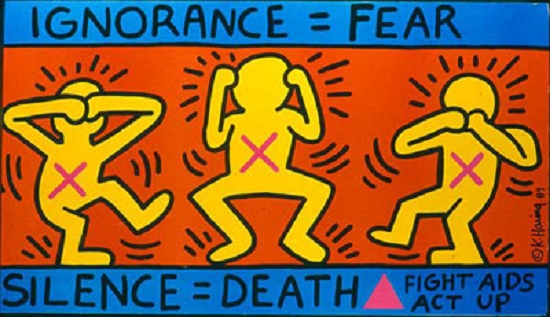
You wait 25 years for a documentary on ACT UP and then two come along at once. Jim Hubbard’s United in Anger (aka the other ACT UP documentary), retains more of the group’s anti-establishment spirit than its more celebrated colleague How to Survive a Plague. What’s striking now is how media-savvy and prescient ACT UP was, talking through the mainstream media to the general population, and producing eye-catching graphics, courtesy of the art collective Gran Fury. It was also a self-documening movement, with numerous side projects, such as DIVA TV, reporting from the scene of the protests. Grassroots in structure, ACT UP was never centralised, with each chapter having its own methods, issues and strategies. It laid the groundwork for many other activist movements, including Queer Nation and Riot Grrrl. And now? Well, now we have the Internet. Progress, eh?
The BFI are listening
While consultation may be the bane of our times, as various governments turn the population into a focus group and then ignore the results, the BFI, at the behest of new broom Clare Stewart, are to be applauded for its bold move in asking whether the current festival name suits the times. Not that any result is binding, but at least they will take the suggestions into account before deciding in time for next year’s festival. Straddling the digital divide, suggestions have come in via social media, as well as the more prosaic Post-It note.
While there is no obvious consensus, there is a move to replace the words ‘Lesbian and Gay’ with ‘Queer’ or ‘LGBT’ in order to be more inclusive, or with less obvious names such as ‘Rainbow’ or ‘Spectrum’ in order to avoid a lengthy acronym that may not be understood. Some decry any change, citing the heritage of the current name and its recognition factor.
But, the discussion also reveals deeper concerns: what’s in a name when it’s the public face of a minority? Reclaimed words such as ‘dyke’, ‘queer’ and ‘poof’ are sites of contention, resistance and, ultimately (if one is lucky), community. Which is a concept that defies branding.
Val Phoenix

